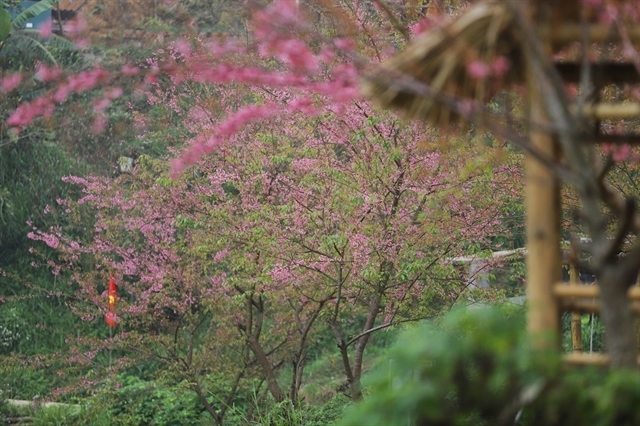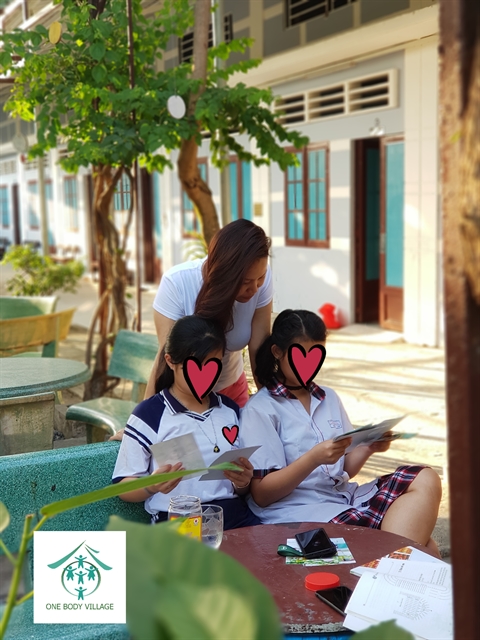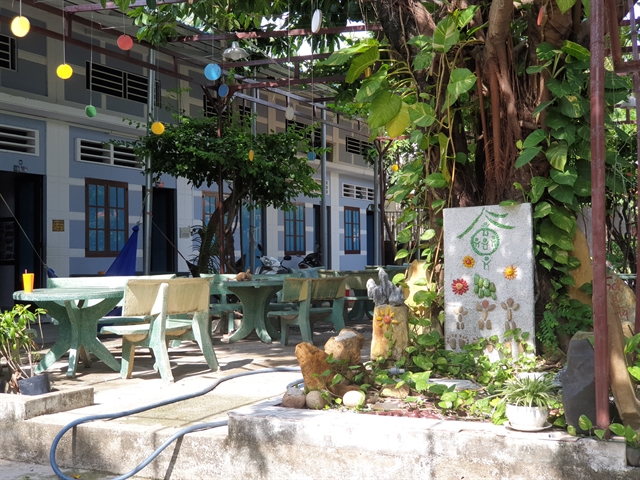 Features
Features

One woman is always willing to help and offer hope to sexually abused and exploited children with her enthusiasm and kindness.

|
| HAPPY HOME: Thảo talks with children at the OBV. Photos courtesy of OBV |
by Thu Hằng
We hear many harrowing tales of child sexual abuse.
When a case of child abuse is discovered, most condemn the perpetrator and think of how they should be punished. However, less attention is paid to the victim, and how they can continue living after such a horrific experience.
One woman is always willing to help and offer hope to sexually abused and exploited children with her enthusiasm and kindness.
For 10 years, Nguyễn Yên Thảo, 39, from HCM City, has rescued and raised hundreds of children who were victims of sexual abuse or at risk of violence.
She is the head of One Body Village (OBV) Việt Nam (known as Nhịp Cầu Hạnh Phúc) in HCM City under the Việt Nam Education and Psychological Science Association.
Nhịp Cầu Hạnh Phúc is funded by the OBV, an American non-governmental organisation established in 2001 to bring hope to sexually abused and exploited children, particularly in Southeast Asia, including Việt Nam, Cambodia, Singapore and Malaysia.
OBV was established in Việt Nam in 2009 and has become the second home and family of unfortunate children involved in sexual abuse incidents.
Difficult journey
Thảo used to work for HCM City Television. She developed an interest in helping young victims of sexual abuse in 2009 after collaborating with reporters on stories about the children.
This led Thảo on a journey full of hardships, pain and sleepless nights, but also lots of laughter at the OBV.
“I want to alleviate the pain of those children. I want to help them to return to normality after the incidents. Nhịp Cầu Hạnh Phúc is a happy and safe environment for them,” Thảo said.
“Our purpose is to improve the lives of high risk and sexually exploited children by giving them shelter, education, medical care, psychological counselling and vocational training for free.”
Nhịp Cầu Hạnh Phúc currently houses 30 youngsters aged between 3 and 21. They will be cared for and live in a safe environment so that they can gradually move on from the trauma and return to normal life.
It will take a long time for a child to regain trust, restore their self-esteem, realise their self-worth, and rebuild their lives.
Many children live at the centre for eight to ten years. When they are confident enough, they will return to live with their families.
Every day they go to school like any other children and return home after class. They receive direct care from six people at the OBV.
Thảo and her colleagues use the media to locate children who are at risk or being abused.
After learning about a child in need of help, Thảo firstly verifies the information then contacts local authorities to reach the victim's family.
She will invite the victim’s family to the OBV so they see where the child can live safely and the centre will welcome the child if the family agrees.

|
| PLACE OF SAFETY: A corner of One Body Village (OBV) Việt Nam (known as Nhịp Cầu Hạnh Phúc) in HCM City. |
Thảo realised the work would be a lot harder than she expected when she first visited the family of a baby that was being sexually abused.
"I thought they would welcome me because I came to help them. But things were not as I thought. They did not co-operate or trust me and thought nobody would want to help."
In some cases, the victims' parents felt the incident should be forgotten and the children should stay at home to earn money.
Most sexually abused children come from poor families.
The families often refuse to allow Thảo to take their children, or force them to return home after a short stay at the centre.
"I faced a lot of difficulties in the first few years doing this job. It made me uncomfortable when the victims' parents did not take care of their children while I wanted to help."
"However, years later, I realised I couldn’t blame them because I’m not in their situation. But I still try to help them as much as possible," she said.
If Thảo can't bring victims to the home, she still tries to monitor them after the incidents.
Regret
Many cases were particularly upsetting, with shocking details of children abused by their own relatives for many years. Often these cases went undetected and the children did not dare speak out.
Around 2,000 cases of violence against children are reported every year in Việt Nam, of which more than 60 per cent involve sexual abuse, according to a report by the Ministry of Labour, Invalids and Social Affairs.
Last year, more than 1,540 cases of violence against children were reported, with 1,570 victims. Over 1,290 of 1,570 children were sexually abused, the report said.
About 80 per cent of children were abused by relatives and acquaintances, Thảo said.
Many stories haunted her, and she still blames herself.
The most tragic story was the death of a 13-year-old girl in Cà Mau Province who was sexually abused by a neighbour.
After suffering the abuse for months, she decided to go to the police.
Local police officers investigated the case but decided not to prosecute the man. On hearing the police’s decision, the girl committed suicide by overdosing on medication.
"She died before she could come to the OBV house. If I worked harder and tried to convince her mother to quickly bring her to us, things would be different," Thảo said.
“There are also many cases where I tried my best but was unable to help because the family refused.”
Not every abused child will be brought to the OBV. They are only welcomed when the family is in a difficult situation or the child molester lives nearby, meaning the youngster is still in danger.
Living with their parents is still the best option for a child, according to Thảo.
Children who are not at the OBV will receive psychological or financial support to continue going to school. Many have dropped out after suffering abuse.
"The most difficult thing is to help each child achieve something so they can move forward," Thảo said.
"We have a great responsibility to take care of them because their families have trusted us and entrusted their children to us. They are all taken care of like I take care of my daughter."
Although tiring and stressful, Thảo is not alone because of the help of others who work at the OBV.
Thảo said that to help the children, she always tries to forget the painful things they have encountered. She always tries to look towards the child's future.
"I try not to remember what happened to the babies. I always look to the future of each child."
A normal house
The OBV's house is similar to other homes. From the outside, no one can tell it is a home for abused children. Only the head of the local People’s Committee and the police are aware.
If someone wants to visit, they are required to provide their details and cannot take any photos. These measures are to protect the identities of the children.
The people who work here are also not allowed to ask children what happened to them.
Children in the OBV are not allowed to ask and tell each other what happened to them. These are part of the organisation’s regulations.
"Each child understands they are not alone and there are others from the same circumstances. This means they can live happily together," Thảo said.
She devotes her time, effort and energy to seeing the smiles and happiness of these unfortunate children. She delights in their daily progress.
"I am happy when they are happy. Many children who have left the OBV after years living here told me they miss me, when they passed college or they got married. These stories make it all worthwhile," Thảo said. VNS




